
Addiction Response Coalition
Jefferson County
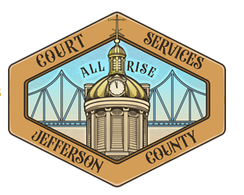
Jefferson County Court Services
Jason Cranney, Director
(812)-274-3941
Add your link here
The JCARC is a group of community members, leaders, advocates and experts dedicated to ending the substance abuse epidemic in our community. We are a collective force of resources that provide access to care, when and where people need it most. We connect prevention options to treatment specialists to public health officials to law enforcement – bringing together the right resources for real results that make a real difference. Together, we deeply and holistically treat this illness, and address its impact on Jefferson County. Together, we save lives and strengthen families. And together, we fight addiction for the health and wellness of all.
What we do:
We address addiction through best practices and rap around set of solutions. We identify strategies, break down barriers, and connect systems to create impact. We function within five areas of expertise:
- Prevention
- Treatment
- Harm Reduction
- First Responders / Criminal Justice
- Business Community
Why we matter:
Substance abuse deeply effects our community and every person in it. Every member of the JCARC has been impacted or lost someone from this epidemic. The numbers are staggering. The struggle is real. Our help is critical. What we do is truly a matter of life and death.
Mission Statement:
The mission of the Addiction Response Coalition is to address the addiction crisis in Jefferson County by connecting individuals to the right resources and treatments, breaking down barriers, and implementing comprehensive solutions.
Service Providers
HOTLINES
LifeSpring Health Systems
800-456-2117
Turning Point Center
Jeffersonville, IN
(812) 283-7116
Healthy Community Initiative (KDH)
Keith Howard
812-274-4145
Center Stone Jefferson County
(812) 265-1918
3008 North Belcher
Madison, IN
Suicide National Hotline
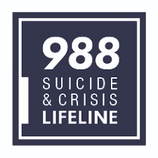
JCARC Advisory Committee Members
- Jason Cranney, Court Services Director
- Michael Hicks, Court Services Community Coordinator
- Honorable Blaine Goode, Superior Court Judge
- Jim Courter, Community member
- Jim Crone, Community Member
- Keith Howard, KDH Healthy Community Iniatives
- Ron Lee, County Commissioner
- Emily McDarment, Health Care Provider
- Tina Mitchell, Health Care Provider
- Mark Overton, Health Care Provider
- Lauren Perryman, Health Care Provider
- Kevin Kellams, Health Care Provider
JRAC
Justice Reinvestment Advisory Council
Overview
Under IC 11-12-2-2 Community Corrections falls under county government and is overseen by an Advisory Board. The Advisory Board meets on a regular basis and approves Community Corrections grants, budgets and policy and procedures.
HEA 1068 requires the establishment of a local Justice Reinvestment Advisory Council (JRAC) that is responsible for promoting and utilizing evidence-based practices in community-based alternatives to incarceration. These functions have been combined into one board.
Community Corrections Advisory Board/JRAC Roster
- The Honorable Blaine Goode, Superior Court Judge
- The Honorable Donald J. Mote Vice Chairman, Circuit Court Judge
- Jason Cranney, Court Services Director
- Julie Mitchell. Secretary Chief Probation Officer
- Chris Shelton, County Council
- Sue Melton, Mental Health Administrator
- David Sutter, Chairman, Jefferson County Prosecutor
- Ben Flint, Jefferson County Sheriff
- Bob Courtney, Mayor of Madison
- Ashley Eklund, Pubic Defender
- Sara Minor, Victim
- Samantha Jones, Ex-offender
- Shawn Scudder, Madison Police Department
- Emily McDarment, Mental Health Administrator
- Alyssa Shelton. Division of Family Resources
- Paula Clark, Education Administrator
- David Bramer, County Commissioner

Community Needs Assessment
The community needs assessment was conducted by the University of Cincinnati to determine levels of activity regarding substance use and the levels of need and support for a residential treatment facility.
To that end the assessment report will help guide actions by local government to establish a comprehensive plan for combating substance abuse in Jefferson County.
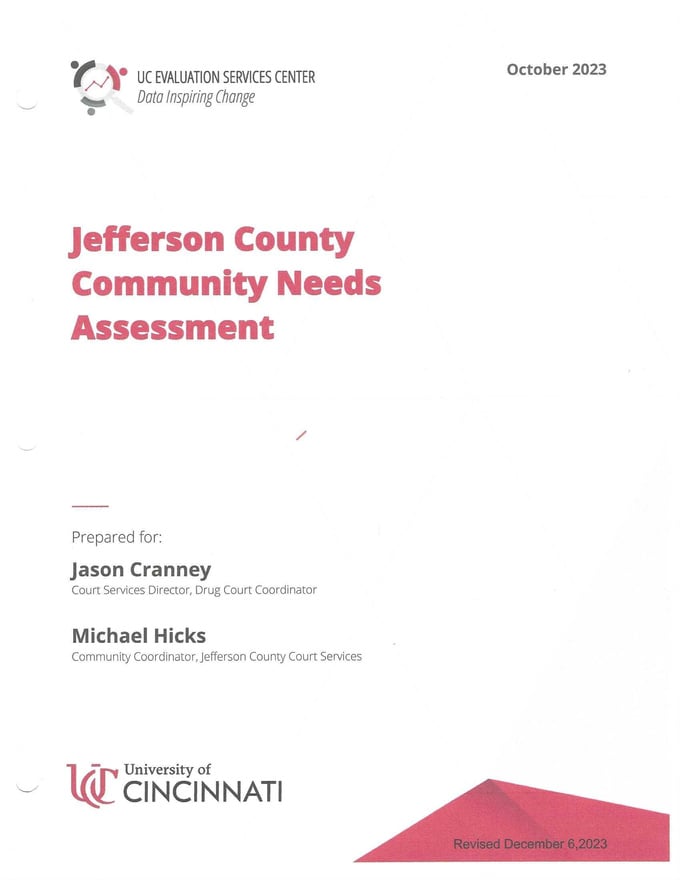

Treatment
Ongoing efforts have been made towards outreach to individuals and families who need treatment, ensure access to treatment, continue to reduce barriers to treatment and initiate strategies for engagement.
Treatment Resources

Harm Reduction
Harm reduction activities in our region have two main purposes – to stop the spread of infectious diseases and to keep people alive so they can eventually benefit from behavioral health care. To this end, activities will include:
STIGMA FREE DISTRIBUTION
Provide practical strategies, tools and comprehensive access to harm reduction services that are delivered without stigma, meet individual needs, are data-driven, and improve the health of the community.
COLLABORATIVE ADVOCACY
Develop key talking points about harm reduction to align stakeholders through content, prioritizing audiences, listening, conducting conversations, and measuring changes.
ELIMINATING BARRIERS
Identifying access barriers with the aim of improving harm reduction services while meeting community needs.


Service Providers
Listed below are links to treatment providers
that serve Jefferson County



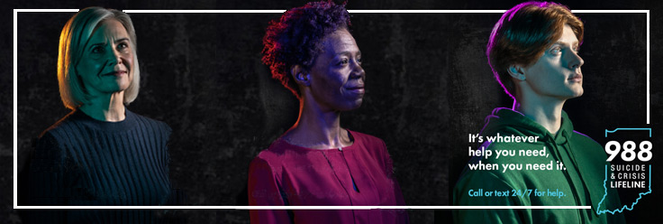


Substance Data
Link below provides substance use data for Jefferson County

Crisis Intervention Team
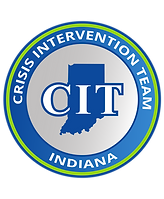
Oveview
The Jefferson County Court Services is seeking to establish a Crisis Intervention Team (CIT) Program in our community. In a CIT program, mental health advocates and mental health agencies support law enforcement agencies by helping identify the community resources to respond to difficult mental health crisis calls. These partners also help develop specialized training for officers and dispatchers on recognizing and responding to mental health crisis situations.
CIT Indiana is a technical assistance center operated by NAMI Indiana, the state chapter of the National Alliance on Mental Illness, with the support of the Indiana Division of Mental Health and Addiction (DMHA) and in coordination with the Indiana Law Enforcement Academy. CIT Indiana supports the development, expansion, improvement, and sustainability of Crisis Intervention Teams.
By supporting the development, expansion, improvement, and sustainability of Crisis Intervention Teams, we can help Hoosier communities improve their response when citizens experience a mental health crisis. By engaging in Sequential Intercept Model mapping, we can help communities improve systems to support individuals impacted by mental illness and substance use disorders who are justice-involved or at risk of justice involvement access treatment, support, and resources to prioritize recovery.
